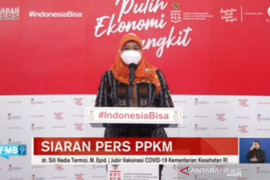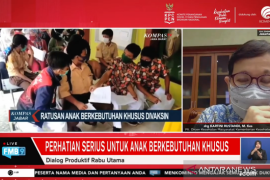Apart from resulting in increasing cases of death, EIDs also bring a negative impact in the social and economic sectors. EIDs are diseases that emerge and attack a population for the first time, or have existed before, but come aggressively and quickly in the number of new cases and the ability to spread to various areas.
Situations included in the EIDs' list are diseases that have occurred in an area in the past, were then under control, but are being reported again in increasing numbers. Sometimes, old diseases also appear in new clinical forms, which can be more severe or fatal, and referred to as old diseases, or re-emergence, with the latest example being a Chikungunya outbreak in India.
The majority of emerging and re-emerging diseases are zoonotic in origin, or emerging from animals to infect humans. The World Health Organization (WHO) found around 60 percent of infectious diseases in humans. Meanwhile, about 75 percent of EIDs in humans in the last three decades have come from animals.
In the last three decades, more than 30 EIDs have been found globally. This number adds to the list of new diseases reported to reach 335 according to scientific research in 1940.
The Asian region often becomes the epicenter of the spread of EIDs, including several countries in the Southeast Asia region connected to the Indo-Gangetic Plain, covering the northernmost and easternmost parts of India, such as Pakistan and Bangladesh.
Another area that has become the center of the spread of EIDs is the Mekong River Basin as the 12th-longest river in the world that stretches across Tibet, China, Myanmar, Thailand, Laos, Cambodia, and Vietnam.
The Nipah virus, Crimean-Congo hemorrhagic fever, and Avian Influenza (H5N1) are examples of diseases that have emerged recently in the Southeast Asia region. Meanwhile, infectious diseases developing in the world throughout 2023 are Mpox or monkey pox, COVID-19, Polio, Legionellosis, Meningococcal Meningitis, West Nile Virus, Listeriosis, Crimean-Congo Haemorrhagic Fever (CCHF), Hantavirus, Yellow Fever, and an increase in respiratory illness (pneumonia) cases.
Related news: Climate change causing an increase in infectious diseases: BRIN
Situation in Indonesia
A pulmonologist from the Faculty of Medicine, University of Indonesia (FKUI), Professor Tjandra Yoga Aditama, stated that urbanization and the destruction of natural habitats are one of the causes of zoonotic diseases since the distance between animals and humans is getting closer. Pathogens, as sources of infection, develop in new ecologies by adapting to hosts other than animals, including humans.
In addition, climate change and ecosystem changes trigger genetic mutations in microbes that are more resistant. As a result, new diseases are difficult to predict but can grow significantly, as humans may have little or no immunity to them.
The Indonesian Health Ministry gathered the results of EIDs' detection in the country based on epidemiological investigation reports up to the 47th week of 2023. From the investigation, the ministry found Mpox as one of the diseases circulating in Indonesia. Since the first case of Mpox was announced on August 20, 2022, another case was reported on October 13, 2023.
Until the 47th week, Indonesia reported the addition of eight confirmed cases of Mpox, thereby bringing the total case count in Indonesia to 59 confirmed cases spread across Jakarta, Banten, West Java, East Java, and the Riau Islands.
The Mpox disease was declared as a public health emergency of international concern (PHEIC) on July 23, 2022. The status has been revoked on May 11, 2023.
Some 91,878 confirmed cases with 167 deaths globally were reported for this infectious disease that is generally triggered through sexual relations between men. On November 18, 2023, several additional cases were found with the three countries with the highest additional cases being the United States, with more than 135 cases; China, with 102 cases; and Germany, with more than 49 cases.
The ministry also found SARS-CoV-2 that causes COVID-19. Although the pandemic status was revoked on August 4, 2023, until November 25, 2023, there were 6,814,248 confirmed cases, with 161,921 deaths, and 6,647,068 recovered cases spread across 514 districts and cities in 34 provinces. Jakarta, West Java, East Java, Bali, and Banten were the five provinces with the highest average daily confirmed cases in the 47th week of 2023.
On May 5, 2023, the WHO also revoked the COVID-19 status as a PHEIC. The total number of confirmed cases of COVID-19 in the world from December 31, 2019, to November 22, 2023, was 772,166,517, with 6,981,263 deaths.
The five countries reporting the highest average daily confirmed cases in the 47th week of 2023 are Iran, the Czech Republic, Armenia, Poland, and Lithuania. As of August 17, 2023, the WHO announced several variants of interest (VoI), namely XBB 1.5, XBB 1.16, and EG.5
Another infectious disease detected in Indonesia was Avian Influenza (H5N1). Indonesia reported 200 cases, with 168 deaths in 2005-2017. Since 2018, there have been no reports of new cases in humans, and only in the 34th week of 2023, two suspected cases of H5N1 were found in Solok District, West Sumatra, with negative laboratory results.
On March 14, 2023, Indonesia also reported additional case of Polio (CVDPV2 type) in Purwakarta District, West Java. The disease was found in seven healthy children without symptoms in the area around the case. Similar cases were also found in three patients in Aceh Province.
Meanwhile, the global situation until the 47th week of 2023 shows no additional polio cases. The number of Polio cases in 2023 totalled 381, comprising 11 WPV1, 109 CVDPV, and 261 CVDPV2. However, in the second week of December 2023, there were positive environmental samples for CVDPV2 in Zimbabwe.
Indonesia also needs to be aware of the potential for Middle East Respiratory Syndrome (MERS-CoV) that was detected in the 45th week of 2023. There are two additional MERS suspects in Yogyakarta and one case in West Nusa Tenggara (NTB) with negative results for MERS-CoV. To date, there are no confirmed cases of MERS-CoV in Indonesia.
However, since the 2013-2023 period, there have been 584 suspected MERS-CoV cases in Indonesia. A total of 577 cases had negative laboratory results, and specimens could not be taken of seven of them.
There were also no reports of additional confirmed cases of MERS-CoV this week globally. The total number of confirmed cases of MERS-CoV in the world from April 2012 to September 2023 was 2,608, with 938 deaths. Most cases were reported from Saudi Arabia, with 2,199 confirmed cases and 857 deaths.
Next is the West Nile Virus spread by mosquitoes with symptoms, such as headaches and muscle aches. Based on research published by Myint in 2014, confirmed cases of the West Nile Virus were found in West Java in 2004, with no additional cases found until the second week of December 2023.
Meanwhile, four additional confirmed cases of West Nile Virus were found in France in the 47th week of 2023. The total cases of West Nile Virus disease reported in Europe this year reached 791, with 66 deaths from 12 European countries.
One additional case of West Nile Virus was found in the United States, bringing the total number of cases of the disease in the United States to 2,281.
In the 40th week of 2023, the Health Ministry also reported a new case of suspected Legionellosis in Bandung City, West Java, which was discovered through sentinel surveillance. This type of pneumonia adds to the list of suspected cases in Indonesia, which is currently at 45 cases, comprising 23 suspected cases in West Java and 22 suspected cases in Bali.
Other countries also reported additional Legionellosis cases in the 47th week of 2023, namely 14 cases in Australia, three cases in Hong Kong, three cases in Singapore, and seven cases in Taiwan. Apart from that, 340 additional cases were found in the 46th week of 2023 in the United States and one case in the 41st week in Taiwan.
Related news: Risk communication crucial in infectious diseases prevention: Ministry
Mitigation
Although a strong public health system is required for dealing with EIDs in Indonesia, other preparations must also be strengthened, such as surveillance, risk assessment, risk communication, laboratory facilities, and response capacity in the regions.
Health Minister Budi Gunadi Sadikin stated that Indonesia implements three strategies for the mitigation of EIDs, namely ensuring the availability of medicines in the country, conducting early detection through the provision of diagnostic tools affiliated with hospital laboratory networks, and carrying out vaccination.
Efforts to track and trace cases are carried out through massive screening of patients and their close contacts. Moreover, case reporting is conducted through the support of integrated data recording and reporting via the SatuSehat Application on smartphones. Case findings will be followed up with contact investigations through community involvement with a network of health service facilities.
Especially in dealing with Mpox, the ministry has provided a total of 1,008 bottles of the Fecovirimat medicine, along with 4,500 Mpox vaccines. The Health Ministry also procured 4.1 million doses of the domestic SARS-CoV-2 vaccine along with the required medicines in Indonesia.
For the polio vaccine, the government trusted the procurement at the state-owned pharmacy company, PT Bio Farma, in Bandung, West Java.
The ministry also established cooperation with several sectors, such as animal health, agriculture, and forestry, at the national, regional, and global levels to monitor the development of EIDs in the world.
Several health science experts have warned that various EIDs in the world may become disease X that could trigger future pandemic if not handled properly.
Members of the community are also urged to play a role in overcoming EIDs through several effective efforts, such as practicing clean and healthy living behavior, consistently implementing health protocols, taking free vaccination provided by the government, and living in harmony with the environment and animals.
Related news: Climate change causes spread of infectious diseases: BRIN
Editor: Yuni Arisandy Sinaga
Copyright © ANTARA 2023












